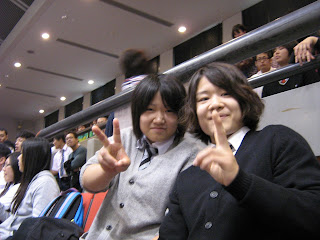To my faithful readers, I know I haven't been updating as regularly as in the beginning. For my defense, I'll tell you that I have very little time between classes, judo, and studying. I'm living a busy life! And if I have a bit of free time, I try to catch up on some ZZZs (sleep) or get a headstart on the next chapter in my Japanese textbook. Furthermore, things are starting to feel like routine now so I don't feel the need to update as often. It's incredible how quickly we adapt to a new environment or way of life.
* * *
 |
| Yasuhiro Yamashita (note: I do not own this picture) |
I saw Yasuhiro Yamashita yesterday. For those who are not familiar with him, he's probably the most famous name in the history of judo, aside from Jigoro Kano (the one who created judo). He took the gold medal in the 1984 Olympics in Los Angeles as well as numerous other gold medals at World Championships. He also went undefeated for almost 8 years, with 203 consecutive victories.
He is still an imposing man but he looks like he could be 30 years old or probably even less! (according to Wikipedia, he's 54 years old now). I think it's mostly due to his facial traits that make him appear much younger than he really is. Anyhow, it was amazing to just be in the same room as him and to finally get the chance to see him with my very own eyes after seeing his face numerous times on video clips or the Internet.
A few more interesting things about judo at Tokai University:
- there are special days for blue guis. If you grip left-handed, you're allowed to wear a blue judogi on Tuesdays and Thursdays. If you're right-handed, you can wear a blue gui on Mondays and Fridays. They're very conscious about gripping stances here and so different colored guis are worn to help fighters pick their opponents according to their gripping style.
- they don't stop... even if you're almost off the floor, or leaning against the wall, they will almost never stop trying to throw you until someone has landed on the mat.
- there is a clear separation between the male and female athletes. In Canada, I'm used to training with boys and following the same training regiment. But here, the two teams have their own training schedules. A few boys will sometimes come down to the girls' practice to be partners for the bigger or more experienced girls but that's about it.
- there is a clear hierarchy in the judo club, what they call
sempai and
kohai. If you are a first-year university student, you're at the bottom of the chain. If something needs to be done, the first-years are responsible. Before practice, they have to sweep the mats, bring out the ice, hand out the belts, etc. And they always have to be very respectful with the older girls. It's a new concept for me. Back at the U of M, the younger athletes are expected to show respect for the older and more experienced fighters. But that's all. No need for bowing or using more polite language. But in Japan, it's very important, and not just in the sports clubs. In all situations, if someone is superior to you (in age or rank within the company for example), you must use a more polite form of speaking and be very careful of not being disrespectful in any way.
Coming up:
- Tomorrow (Friday), I'm taking the night bus to Amagasaki along with the other judo girls. There is a big team competition in which both the men's and women's teams are competing. I'll be staying with one of the athletes' family. I'm also told that I'll have the chance to visit an
onsen, which is a hot spring. They're very popular here and I've heard a lot about them so I'm curious to see what they're like.
- There is a student festival next week, which means no school for a whole week!!! Judo doesn't stop of course but having that one week break is something I've been waiting impatiently for since we first learned about it. Apparently, there are supposed to be little tents and shops set up around campus that sell little souvenirs or delicious food. Pictures guaranteed! : )























